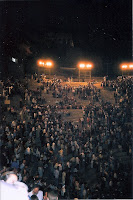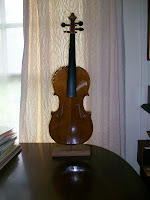
She got pregnant. The father was married. She was living with Somebody Else. Partly because she was nursing, her breast cancer went undiagnosed until it was too late. They removed one breast. When they wanted to remove the other, she balked. “I don’t mind dying,” she said, “but I mind being cut up into little pieces.”
She was beautiful, and men always tried to approach her. One of them said “Oh, you’re in the arts? I almost went into the arts.” Her withering response was “Close call for the arts.”
She wanted the baby to be born at home, but after laboring all afternoon and all night (we played a recording of Bach’s Goldberg Variations over and over), she finally consented to go to a hospital to have a late-stage vacuum procedure. She came right back and limped up the steps, holding the baby. Somebody Else, who hadn’t slept for 24 hours, was right behind her. “Is he all right?” she asked, showing me the little face.
When the baby was a year old, we got three tee shirts. Mine said “I am the boy’s godmother.” Somebody Else’s said “I am the boy’s godfather”. The baby’s shirt said “I am the boy.”
Shortly after that, in June, 1983, She died, leaving the godfather a baby who wailed night and day. Social Services learned that there was an orphan child living with an unrelated adult. Things could not go on as they were.
Her mother, brothers and sister did not want the baby, but they hoped he would be adopted out near them, on the other coast, so they could see how he did. Trying to buy time, our male friends said they could each claim to be father of the boy (which is what we called him, the boy.) Meanwhile, the baby lived in the house where he was nearly born, with the man who had assisted in his delivery.
She had picked a new mother and a new family and had given the new mother a valuable ringas a token of the promise. The family asked for the ring back. They produced a will which would benefit the baby, but only when he turned forty years of age.
Then the baby’s father came forth, scraping together the money to fly from the east coast. “Why weren’t you here before this?” we asked, hugging the baby closer. “How could you let her go through all this without you?”
The baby held out his hands to the father. The father cried. They looked like each other. The father stated his case to each friend who was helping to tend the baby. “I always told her I would take care of him,” the father said. The baby held out his hands to the father again, and the father cried again.
Finally the father said the magic words. “My wife knows about this. We couldn’t afford to fly her out, but she has always wanted a baby boy. She wants the baby.”
Since the father had been named on the birth certificate, there really was nothing preventing him from taking the baby away, but still he wanted our permission. Finally there was nothing to do but grant it. The youngest and most cheerful of us accompanied the father and the baby to the airport. Somebody Else provided an Owners’ Manual.
From a distance, we followed the boy’s progress. He overcame a minor speech impediment. He went to school. His maternal grandmother actually saw him once in a while and tried to give him piano lessons. He learned to slaughter a hog. He played football.
When he graduated from high school, they gave him a plane ticket to come out and see where he was born.
As a baby, the boy had what I have to call winning ways. He had a disarming smile; he was charming. We were glad, because we knew he would need to be charming in his new life. We all wanted to see what kind of person he had become. He still had winning ways, but he was very different from the person he probably would have become if his mother had lived to raise him. He would have been sophisticated and well-educated and articulate. “I am really a simple person,” his mother used to say. But she wasn’t, not at all.
The boy had grown into a beautiful sweet graceful youth, but he hadn’t gotten very good grades at school, didn’t want to go to college, had no particular career in mind. We took him to the museum, but after a short time, he said “That’s about enough art for me.” All he really wanted to do was to marry his high school sweetheart, and so he did, almost as soon as he got home.
Yesterday we received invitations to a baby shower for the boy and his wife. They waited several years. They were in a hurry to get married, but they didn’t want to start a family right away. I wondered what his mother would think if she could look down and see how the boy turned out. I think she would have said that he was just fine. I wished she could have lived to see her grandchild.













.jpg)












